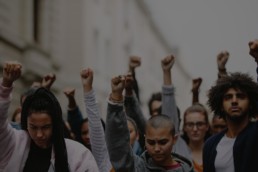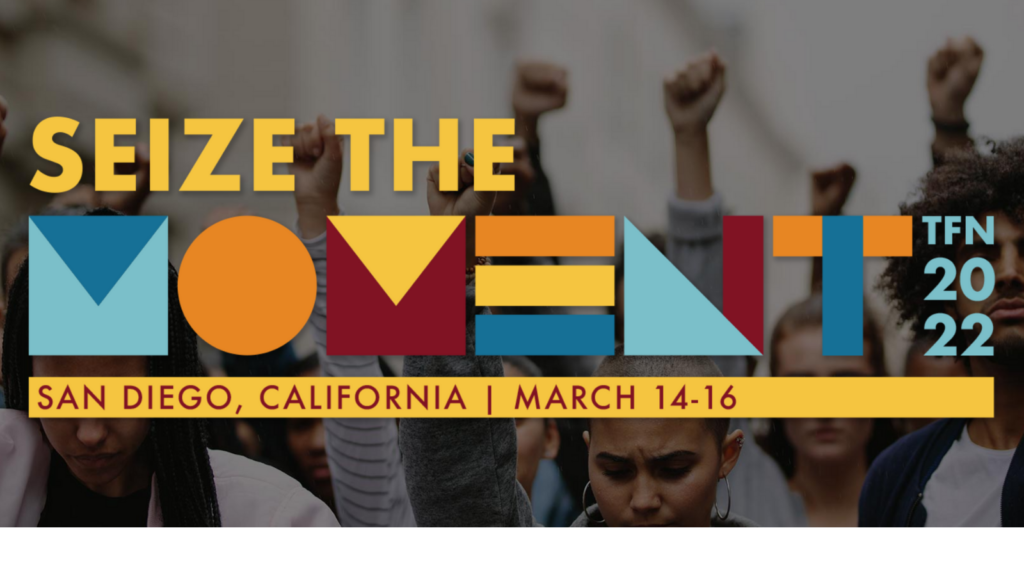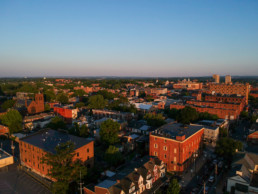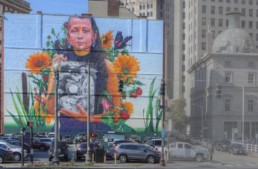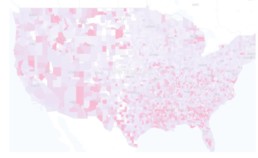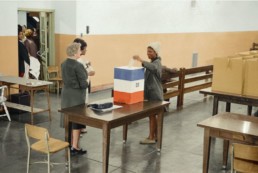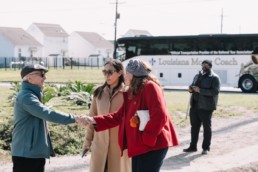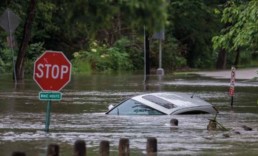Join our PLACES Alumni at #TFN2022!
→ Register now for #TFN2022!
TFN’s 2022 Annual Conference: Seize the Moment is an opportunity to come together after more than a year of disruption to share how philanthropy can effectively and equitably deploy resources where they are most needed.
TFN’s PLACES Fellowship has been giving leaders in philanthropy the tools they need to embed equity into both their professional and personal lives for over a decade. Join us in San Diego as we share strategies and stories that are helping move our communities toward justice.
Below, are some agenda highlights featuring PLACES alumni and sessions that may be of interest.
TFN2022 sessions are designed to be intersectional, cross-cutting and grounded in racial equity and speak to activism, collaboration and movement building. Take a look at our preliminary TFN2022 Conference Agenda to see what else we'll be learning in San Diego!
Day 1 | Monday, March 14
*Concurrent Breakout Sessions*
Why Are All of the Black Philanthropists Sitting Together at the Conference? | 2 PM PT


Taking a page from Beverly Daniel Tatum’s book Why Are All the Black Kids Sitting Together in the Cafeteria?: And Other Conversations about Race, we’ll create a space for honest conversation about and reflections on the specific experiences of Black funders working in philanthropy.
Alumni of TFN’s 2020 PLACES Fellowship will deliver a Black Girl Magic experience designed to unpack Blackness in a white context. During this interactive session, attendees will join in on a point/counterpoint discussion examining the question: Why Are All of the Black Funders Sitting Together at the Conference?
Joining us in conversation (pictured above from left):
Le Anne Alexander, Advisor, Rockefeller Philanthropy Advisors, 2020 PLACES Fellow
Rayana Grace, Program Officer, Island Foundation, 2020 PLACES Fellow
Creative Financing for Equitable Climate Resilience: What Funders Need to Know | 2 PM PT
Join us for a dynamic conversation on how foundations can deploy their resources — including money, influence and relationships — to help develop investment ecosystems that enable capital to flow to equitable climate resilience efforts.
We’ll learn about the Center for Community Investment's (CCI) recent publication, Seeding Climate Resilience Through Equitable Investment, which offers case studies of successful climate resilience investments, including the role of philanthropy, surfacing a set of strategies that take aim at the systems underlying the inequitable distribution of risk.
Featured Speakers:
Saneta deVuono-powell, Co-Founder and Partner, GroundWorks Consulting
Paulina López, Executive Director, Duwamish River Cleanup Coalition
Alberto J. Rodríguez, Strategic Advisor, Duwamish Valley, City of Seattle
Omar Carrillo Tinajero, Director of Innovation and Learning, Center for Community Investment, PLACES 2020 Fellow (Moderator)
Rebalancing Power & Profit in Rural America's Communities of Color | 2 PM PT
Rural America, especially communities of color, face the highest rates of poverty and disinvestment in the U.S. Eighty-five percent of “persistent poverty counties” — defined as having a population of 20 percent or more living at or below the poverty line for at least 30 years — are rural. One in four children in rural America lives in poverty. But these communities receive minimal investment from federal sources and receive less than 8 percent of philanthropic giving. We’ll hear from community developers and Community Development Financial Institutions working in rural areas, with a focus not only on the challenges facing these regions — but the innovations needed to truly support rural communities of color.
Featured Speakers:
Lakota Vogel, Executive Director, Four Bands Community Fund
Jackie Pata, President/CEO, Tlingit and Haida Regional Housing Authority
Susan Anderson, Senior Director, Enterprise Community Partners (Moderator)
Dismantling House Segregation: A Land-use Policy Roadmap for Systemic Change | 2 PM PT
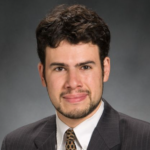
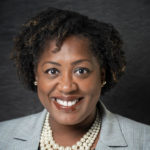
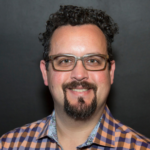

This interactive session will explore the role of state and local land-use policies in creating and maintaining racial segregation. We’ll also examine how coordinated legal advocacy, organizing and public education can create structural change that enables Black, Latinx and other people of color to equitably access historically exclusionary communities and retain equity in gentrifying neighborhoods.
Joining us in conversation (pictured above from left):
Adam Gordon, Executive Director, Fair Share Housing Center
Cashauna Hill, Executive Director, Louisiana Fair Housing Action Center
Samuel Tepperman-Gelfant, Managing Attorney, Public Advocates
Jennifer Martinez, Director of Advocacy for Housing Affordability at the Chan Zuckerberg Initiative (CZI) (Moderator)
Plenary | Trust-making: Building Equity, Belonging & Community | 4 PM PT
Join us for an interactive, peer-to-peer experience crafted by Marnita’s Table, a mission-driven nonprofit that brings people together to find common ground on important public policy issues. We’ll learn about the organization’s Intentional Social Interaction (“IZI”) model that helps individuals, businesses, NGOs and government agencies achieve equity and inclusion goals.
Marnita Schroedl, CEO, Marnita's Table
Lauren Williams, Director of Learning, Marnita's Table
Day 2 | Tuesday, March 15
*Concurrent Breakout Sessions*
The Future of Climate Action is Latinx | 10:30 AM PT
Join us for an intergenerational conversation led by Latinx youth leaders at the forefront of the climate movement, in dialogue with more veteran members of the Latinx community, on the future of climate action.
Featured Speakers:
Paloma Aguirre, City of Imperial Beach Councilwoman and Senior Program Officer for International Community Foundation
Mary Skelton Roberts, Senior VP for Programs, Energy Foundation, 2011 PLACES Fellow
Denisce Sarai Palacios, Jolt Action (Moderator)
Participatory Grantmaking: Investing in Shared Power and Community Listening | 10:30 AM PT
This session will explore how to create an authentic participatory grantmaking fund, how these funds are structured and governed, and how they are working to support BIPOC leaders. You will hear from fund grantees, foundation staff who manage these funds, and funders who worked with their foundation boards and grantmaking colleagues to establish the funds.
Featured Speakers:
Alicia Smith, Executive Director, Junction Coalition
Crystal M.C. Davis, Vice President of Policy & Strategic Engagement, Alliance for the Great Lakes
Day 3 | Wednesday, March 16
Flash Talk | 10:50 AM PT
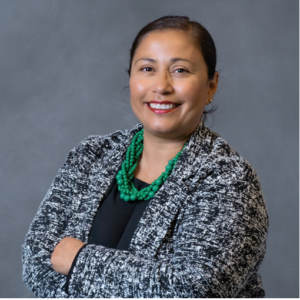
Norma Chávez-Peterson, ACLU of San Diego and Imperial Counties, will join us for a Flash Talk sharing her insights on the ongoing fight for civil liberties and justice for marginalized people — and why funders need to step up and “seize the moment” in this pivotal and fragile moment in American democracy.
Be sure to check out the #TFN2022 Annual Conference webpage for updates to the agenda, health and safety protocols and venue information.
Five Communities Receive Partners for Places Mini Grants
BY TFN STAFF
The Funders Network, in partnership with the Urban Sustainability Directors Network, is excited to announce the latest round of Partners for Places Mini Grants. These grants are intended to help local governments, place-based funders and frontline community-led groups build relationships, align project ideas, and center racial equity in water, sustainability and climate action work.
The Partners for Places Mini Grants are designed to spark new relationships or deepen existing connections that will help communities develop a successful Partners for Places project application in the future.
Partners for Places is a matching grant program that improves U.S. and Canadian communities by building partnerships between local government leaders, community groups and place-based funders. National funders invest in local projects developed through these partnerships to advance efforts to create communities that are sustainable, prosperous and just. These sustainability efforts take place from coast to coast, in communities both large and small and focus largely on empowering and engaging low-income neighborhoods.
These five communities have received Partners for Places Mini Grants:
Essex County, Mass.:
Amount: $8,000
Project title: Data/Synthesis: Environmental Justice in Essex County
Project Description: This grant will be used to map environmental justice challenges across 34 cities and towns in Essex County, Mass., using a data-driven, integrated approach that identifies risk areas; highlights racial/ethnic inequities; and provides a county-wide summary of needs, challenges and interventions.
Frontline community-led group: Groundwork Lawrence
Funder partner: Essex County Community Foundation
Fort Collins, Colo.:
Amount: $10,000
Project title: Reimagining a Sustainable Business Program
Project Description: This grant will be used to support the efforts of partner organizations to identify and build relationships with historically underrepresented business owners with support from frontline community-led group(s). Together, they will work to create a Partners for Places matching grant proposal for an equitable, community-driven sustainable business program and capacity building process.
Frontline community-led group: BIPOC Alliance
Funder partner: Community Foundation of Northern Colorado
Missoula, Mont.:
Amount: $10,000
Project title: Integrating Traditional Ecological Knowledge and Resiliency Planning
Project Description: This grant will support the development of emergent relationships between partner organizations. The grant will also be used to help identify ways in which the groups can work together and pursue funding opportunities to integrate traditional ecological knowledge and climate adaptation strategies, especially in the implementation of county-wide climate resiliency plan, Climate Ready Missoula.
Frontline community-led group: All Nations Health Center
Funder partner: Headwaters Foundation
Pittsburgh, Pa.:
Amount: $10,000
Project title: Connecting Pittsburgh’s West End to the Riverfronts
Project Description: This grant will be used to build on a strong partnership with the City of Pittsburgh’s Office of Resilience and strengthen emerging relationships with frontline organizations in the city’s West End. It will build a foundation for connecting the community to Pittsburgh’s 15-mile, 1,050-acre “Loop” system of trails, parks and public open space.
Frontline community-led group: H.O.P.E. for Tomorrow, Inc.; Riverlife
Funder partner: The Heinz Endowments
Westland, Mich.:
Amount: $10,000
Project title: Lower Rouge River Water Trail Leadership Committee
Project Description: This grant will help ensure the Lower Rouge River Water Trail Leadership Committee reflects the diversity of the communities aligned with the water trail, and will be used to facilitate strategic planning meetings, community outreach and engagement.
Frontline community-led group: The Norwayne Community Citizens Council; Friends of the Rouge
Funder partner: Lower Rouge River Water Trail Leadership Committee
About Partners for Places
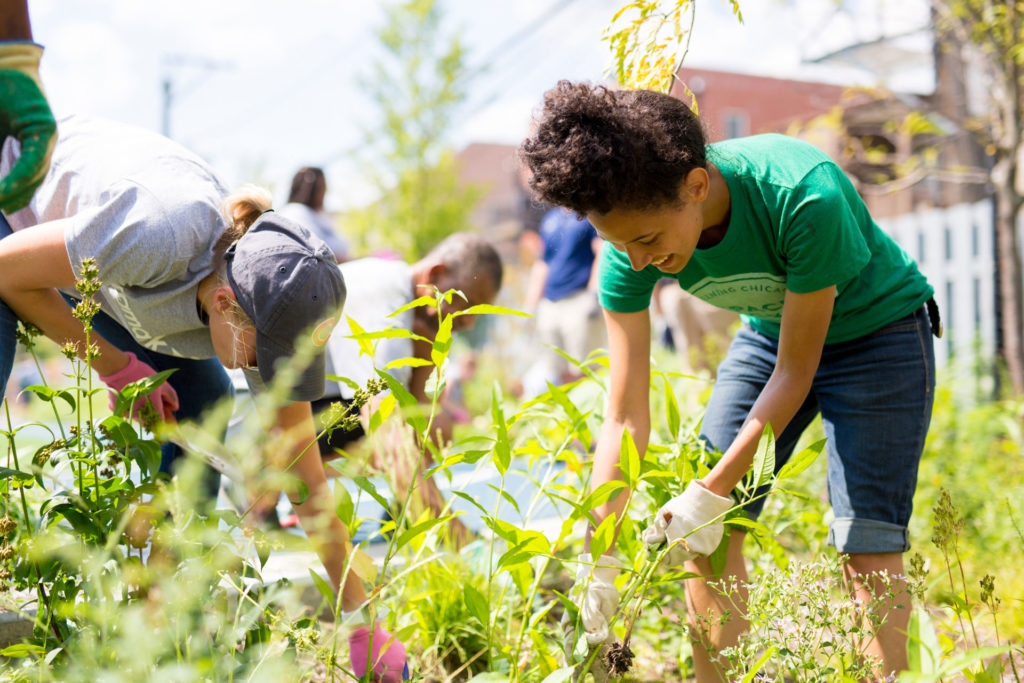
To date, Partners for Places has awarded over $8.5 million across North America in this successful matching grant program, leading to over $18 million in investments.
The matching grant program brings national funder investors together with place-based funders to support equitable sustainable climate action and green stormwater infrastructure projects. The program is currently supported by five investor foundations: The JPB Foundation, Kendeda Fund, The Kresge Foundation, New York Community Trust and the Pisces Foundation.
Read about the latest round of Partners for Places matching grant recipients here.
To learn about the previous round of Partners for Places Mini Grants, visit here. (All grant announcements can be found on the Partners for Places webpage.)
For questions about the Partners for Places Mini Grants or matching grants program, please reach out to Ashley Quintana.
Partners for Places FAQ's
→ Where is Partners for Places making an impact?
Read previous grant announcements and explore the Partners for Places Grantee Map here.
→ Where can I learn about completed Partners for Places projects?
Visit the Partners for Places Idea Bank to explore what grantees are doing, learning and sharing.
→ When is the next round of Partners for Places matching grants?
Partners for Places will open a new round of funding in late February 2022.
For more information about Partners for Places, please reach out to Ashley Quintana, ashley@fundersnetwork.org.
How Funders Can Support Clean, Reliable Water for All
By Allison Harvey Turner, Randall Kempner, and Ridgway White of the Water Foundation (crosspost)
This post excerpted below was originally published by the Water Foundation on the Currents blog. It also appear in Inside Philanthropy.
"It’s time to redesign water systems in the United States to meet the needs of all people and communities — not just the privileged. Our present water system structure leaves many, particularly poor people, at risk of significant health and safety dangers. Today, amid a public health emergency, millions of US residents do not have clean water, and race is the strongest predictor of whether someone has running water at home.
According to DigDeep and the US Water Alliance, people of color lack access to safe and affordable drinking water at much higher rates than white people. They also are most likely to be impacted by floods and droughts, which can disrupt water systems.
The crisis facing US water infrastructure is of our own making. Federal funding for water infrastructure has plummeted since the 1970s and now accounts for just 4% of all water-related capital investment. The majority of water infrastructure funding currently comes from local water rates and state funding, which often reinforces underinvestment in poor communities.
With population growth and climate change, the need for these investments is even greater than expected — but the money is just not there. Or more accurately, our elected leaders have failed to appropriate sufficient funds to meet this core human need.
The public is increasingly aware of this failure. Even as voters called on Congress to pass new COVID-19 relief and recovery measures, public support for immediate water investments remained high. Recent polling by the Water Hub at Climate Nexus found that 79% of US voters supported assistance for families struggling to pay water bills, and 77% supported investing in preparation for future floods and droughts. By a 2-to-1 margin, voters want the federal government to immediately invest more in water infrastructure."
You can read the full blog post here.
About the Authors
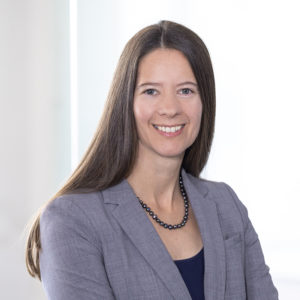
Allison Harvey Turner is CEO of the Water Foundation.
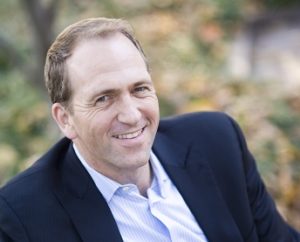
Randall Kempner is CEO of the Cynthia and George Mitchell Foundation.
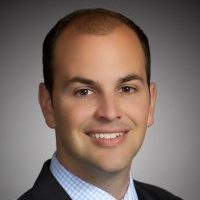
Indigenous & Black Philanthropy in Canada: Growing Black & Indigenous Leadership & and Investment in the Philanthropic Sector
By: The Funders Network Staff
Indigenous & Black Philanthropy in Canada: Growing Black and Indigenous Leadership and Investment in the Philanthropic Sector
Friday, December 11
1:00 – 2:00 p.m.
Register Now!
The TFN PLACES Fellowship alumni invite all current fellows, alumni and TFN members to join us for a frank discussion with our Canadian fellows to talk about Indigenous philanthropy and representation in the Canadian sector and the lessons that can be learned and shared from their work over the last ten years to grow leadership and investment for Black and Indigenous professionals in both the Canadian and the U.S. philanthropic sectors.
Speakers Include:
- Kris Archie, CEO, The Circle on Philanthropy
- Mohamed Huque, Board of Directors, Inspirit Foundation
- Ajeev Bhatia, Manager of Policy and Community Connections, Center for Connected Communities
- Craig Stumpf-Allen, Director of Grants and Community Engagement, Edmonton Community Foundation
About PLACES
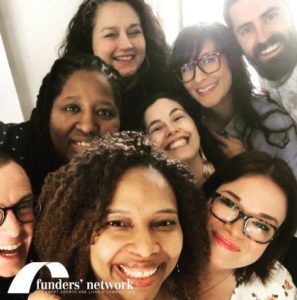 In 2008, the The Funders Network launched PLACES (Professionals Learning About Community, Equity and Sustainability), its first philanthropic leadership development initiative. PLACES is designed as a year-long fellowship program that offers tools, knowledge and best practices to enhance funder grantmaking decisions in ways that are responsive to the needs and assets of low-income neighborhoods and communities of color. We are currently at over 140 fellows and look forward to going over the 150 mark in 2020.
In 2008, the The Funders Network launched PLACES (Professionals Learning About Community, Equity and Sustainability), its first philanthropic leadership development initiative. PLACES is designed as a year-long fellowship program that offers tools, knowledge and best practices to enhance funder grantmaking decisions in ways that are responsive to the needs and assets of low-income neighborhoods and communities of color. We are currently at over 140 fellows and look forward to going over the 150 mark in 2020.
As a result of participating in the PLACES program, fellows develop:
An in-depth knowledge of how decisions about growth and development relate to issues of race/ethnicity/class;
Tools and resources to help them increase their effectiveness as grantmakers;
Exposure to best practices of grantmakers working in this field;
Leadership development and skill building opportunities;
Expanded networking opportunities; and
Access to PLACES and The Funders Network.
Join Us For Our GREEN 2020 Virtual Meeting: Power, Equity, Climate & Sustainability
By: The Funders Network Staff
Register Now!
December 2-3, 2020
TFN’s GREEN 2020 Virtual Meeting will offer an opportunity to bring together diverse voices from across the sector to share learning, explore strategies and identify key issues that are impacting grantees, partners and the communities we serve.
We hope you'll join us as we:
• Deepen learning from practitioners and peers with a focus on racial and social justice, power building, and equity-centered climate and sustainability investments.
• Recognize/strategize how the multiple challenges, inequities, and harms exacerbated by and laid bare by COVID-19 call for new funder strategies centered in racial justice.
• Share learning, engage with funder colleagues on intersectional issues, and explore collaborative opportunities.
• Address key cross-cutting topics that align with our theme: Power, Equity, Climate, and Sustainability.
Agenda Overview
Wednesday, Dec. 2
(Afternoon ET/Morning PT)
• Panel: 2020 Election Results and Implications for Climate Mitigation/Adaptation and City Sustainability
• Panel: From Community Engagement to Collaborative Governance: the Providence Racial Equity Journey and Learning Lab
• Funder Social Hour: A Taste of Rhode Island
Thursday, Dec. 3
(Afternoon ET/Morning PT)
• Panel: Energy Democracy and Justice: Broadening Economic Opportunity, Bringing Economic Relief
• Funder Discussion: Transforming Philanthropic Practices to Center Equity
Stay tuned for more details on session times and speakers!
We are offering individual registration as well as discounted flat group rates for both TFN members and non-members.
Registration fees help support TFN's GREEN working group efforts as well as the network's over-arching mission to leverage philanthropy’s unique potential to help create communities and regions that are sustainable, prosperous, healthy and just for all people. These fees also help us offset programmatic and operational costs incurred in the planning and production of virtual events, including honoraria for invited nonprofit speakers.
Individual Rates
Member: $199
Non-member: $299
Flat Group Rate
Foundations with three or more registrations are eligible for a discounted flat group rate.
Member: $399
Non-member: $499
Register here.
We recognize that many organizations are facing challenges during these uncertain times, so if cost is a barrier to participating in this event, please reach out to Ashley Quintana, at ashley@fundersnetwork.org.
Who Should Attend
Registration is open to donors, staff, directors, and trustees of all grantmaking institutions. We are seeking to create a small and intimate gathering of funders with the goal of learning, sharing and facilitating strategic conversations about where philanthropic resources can have the greatest impact.
Thank You!
Thank you to our funder planning committee for their ideas, guidance, and assistance in planning this meeting:
• Diane Ives, The Kendeda Fund
• Zoe Kircos, People for Bikes
• John Mitterholzer, The George Gund Foundation
• Wren Patton, The Summit Foundation
• Jennifer Pereira, Rhode Island Foundation
• Mariella Puerto, Barr Foundation
• Jen Somers, Energy Foundation
We are looking forward to a terrific and inspiring meeting and hope that you can join us!
National Equity Atlas: Unlocking the Insights of Disaggregated Data
By: The Funders Network Staff
Advancing economic, environmental and social justice means centering racial equity in grantmaking, advocacy and policy work.
How can we use data to inform our efforts to create a more equitable society?
Join TFN's Inclusive Economies for a webinar exploring the National Equity Atlas, a one-stop-shop for data and policy ideas to advance racial equity and shared prosperity, produced through a research partnership between PolicyLink and the University of Southern California Equity Research Institute.
National Equity Atlas:
Unlocking the Insights of Disaggregated Data
Dec. 8 at 2 p.m. ET
Register here.
Please register by Dec. 5 for this funders-only webinar
Speakers
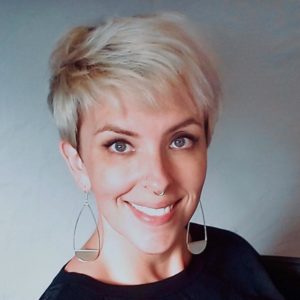 Abbie Langston
Abbie Langston
Senior Policy Associate
PolicyLink
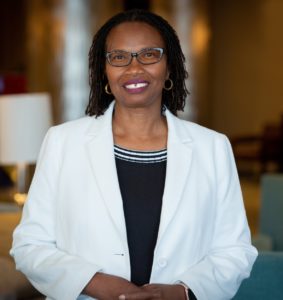 Patricia L. Smith
Patricia L. Smith
President & CEO
The Funders Network
Moderator
About the National Equity Atlas
The National Equity Atlas was built to democratize data and make the facts accessible and actionable to everyone — including the grassroots organizations that possess invaluable firsthand knowledge of inequities yet often lack the resources to gather, analyze, and display the quantitative data so crucial to policy campaigns to address them.
Originally launched in 2014, the updated Atlas builds upon its previous data infrastructure but provides new indicators, more detailed data for existing indicators, and additional ways to explore, share, and use the data, including:
Equity data insights, with 31 deeply disaggregated indicators for 301 geographies
Original research and data analyses
The first-of-its-kind Racial Equity index, which compares the state of racial equity across the nation
Policy solutions to build an equitable economy.
Join this webinar to learn how to use this powerful equity resource and how we can support local changemakers leading the way toward equity.
About Inclusive Economies
TFN’s Inclusive Economies working group brings place-based funders and related partners from across the sector together to build working relationships, advancing understanding of practices and policies that lead to inclusive prosperity and taking joint action that drives the field forward. We apply a three-part focus — race, place and prosperity — to economic growth and development. A particular goal is connecting people and neighborhoods of color to employment and wealth-building opportunities through investment, systems change, and policy reform.
For more information, please contact TFN Associate Hazel Paguaga.
The Funders Network Signs on to United Philanthropy Forum's Commitment To Building A National Community
By The Funders Network Staff
The Funders Network President and CEO Pat Smith is among more than 30 leaders of philanthropy-serving organizations calling on the philanthropic sector and other institutions to "use all of your moral, civic, and social capital to voice your strong and vigorous support for preserving and strengthening our democratic institutions."
The letter, titled A Commitment to Building a National Community, was coordinated by the United Philanthropy Forum, It acknowledges that "much work remains to address the serious threats to our democracy that have been exposed during this election season, and philanthropy has an important role to play."
Among the calls-to-action are:
- The administration of free and fair elections.
- Support for a peaceful transfer of power.
- Philanthropic leaders and institutions to use all of their moral, civic, and social capital to voice support for preserving and strengthening our democratic institutions.
- The use of philanthropic financial capital to invest in organizations that are working year-round to improve the key pillars of our democracy, including free and fair elections and systems of representation, an informed and active electorate, and laws to adequately protect all voters’ rights.
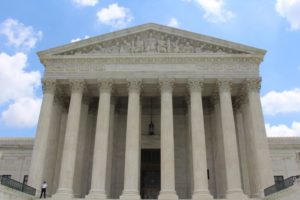 "As we head into 2021 and the seating of a new administration and a new Congress, the Forum continues to envision a courageous philanthropic sector that catalyzes a just and equitable society where all can participate and prosper," reads the letter. "We stand ready to work with the Biden-Harris administration and members of Congress by advocating for legislation and regulations that address inequities across the country, recognize systemic racism, and seek to rectify social injustices. We will also continue to work to strengthen our democracy by supporting a participatory civil society with fair representation for all.
"As we head into 2021 and the seating of a new administration and a new Congress, the Forum continues to envision a courageous philanthropic sector that catalyzes a just and equitable society where all can participate and prosper," reads the letter. "We stand ready to work with the Biden-Harris administration and members of Congress by advocating for legislation and regulations that address inequities across the country, recognize systemic racism, and seek to rectify social injustices. We will also continue to work to strengthen our democracy by supporting a participatory civil society with fair representation for all.
In her keynote address at the 1976 Democratic National Convention at Madison Square Garden in New York City, the Honorable Barbara Jordan (D-TX) spoke about the concept of building a national community:
'We are a people in a quandary about the present. We are a people in search of our future. We are a people in search of a national community. We are a people trying not only to solve the problems of the present… but we are attempting on a larger scale to fulfill the promise of America. We are attempting to fulfill our national purpose, to create and sustain a society in which all of us are equal.'"
To read the full letter as well as the list of signatories, please visit the original post: A Commitment to Building a National Community.
VOTE! FIGHT! ACT! REPEAT!
By: Dion Cartwright, Director of Equitable Initiatives and Leadership Development
This message originally appeared in the PLACES Connection Newsletter, which goes to the Alumni of the PLACES fellowship.
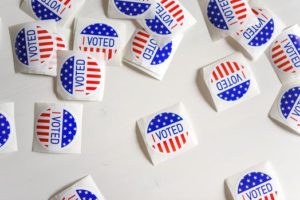 Prior to (and following) the Voting Rights Act of 1965, Black people were often harassed, intimidated and threatened when they would try to register to vote. Voter literacy tests and many other barriers were used to prevent Black people from being able to exercise their civil rights. There were policies in place that would give local jurisdictions the authority to restrict equal rights under the law. Native Americans experienced similar challenges and were often forced to assimilate to European culture before being given their rights to vote. The Latinx community was also negatively impacted by similar barriers to voting. Non-English-speaking voters were also often shut out of voting because of lack of accessibility to translated voting materials and other important legislation.
Prior to (and following) the Voting Rights Act of 1965, Black people were often harassed, intimidated and threatened when they would try to register to vote. Voter literacy tests and many other barriers were used to prevent Black people from being able to exercise their civil rights. There were policies in place that would give local jurisdictions the authority to restrict equal rights under the law. Native Americans experienced similar challenges and were often forced to assimilate to European culture before being given their rights to vote. The Latinx community was also negatively impacted by similar barriers to voting. Non-English-speaking voters were also often shut out of voting because of lack of accessibility to translated voting materials and other important legislation.
During the 1960s, there were many youth-led cultural and political movements that erupted as a result of poverty, police violence, the murder of Black activists, voter suppression, the fight for reproductive rights, LGBTQ+ rights, and other social issues impacting Black, Latinx, Indigenous and other marginalized communities and peoples. However, in spite of the constant barriers and legislative loopholes/abuses used to suppress the vote or to prevent changes to discriminatory legislation, people stayed resilient. People continued to fight, march and spend entire days in long lines to exercise their rights.
This sounds familiar, right? Today, voting rights protections continue to be under attack. We’ve seen voter suppression increase and continued attempts at suppressing the votes of Black, Latinx, Indigenous and other marginalized communities and peoples. We have seen police violence that has sparked nation-wide uprisings, solidarity marches in the streets and a renewed fight against the political and criminal systems of oppression that perpetuate discrimination and racism.
I share this to remind each of us that the challenges we face today aren’t new. The discriminatory practices targeting marginalized people have always been used to discourage engagement in the political, social and economic infrastructure of the U.S. Although the racist and dehumanizing policies of the current administration seem unprecedented, we know they are not. The system is working exactly as it was designed to — to attack the civil and human rights of all people, but specifically of those of Black, Latinx, Indigenous and other marginalized peoples.
As we prepare for the upcoming election results, I want us all within our PLACES network to keep some very important perspective at hand: no matter what the outcome of November 3rd, we must remember that our work has the ability to create the change we are voting for. We are the change makers.
What does that mean? It means we must invest in the capacity building of the communities most impacted by the political, social and economic policies that have failed to protect our most vulnerable and disenfranchised. As funders, we have an obligation to fight to deconstruct the unjust systems of oppression that hurt and steal from our communities, especially those of color. We must ask ourselves, “How am I contributing to these unjust systems and what power am I willing to give up or challenge in order to see true justice and liberation for all come to fruition?” Our future is not dependent upon the results of this election. It is dependent on our resiliency as we face the gatekeepers of change.
Find hope in knowing that the work you do matters. Find hope in your refusal to let the obstacles we face today daunt you. Find hope in knowing that your unwillingness to compromise who you are, even while under immeasurable stress, violence and grief, represents you fighting for yourself and all who came before you and those that will come after you.
We are (thankfully) not politicians, but we are the advocates and sellers of hope in our sector and communities — and by doing so we are the brick layers of justice and liberation. Keep going — the road we have been fighting for is already being built by you.
Note: The Funders Network’s President and CEO Pat Smith is among the more than 100 philanthropic leaders calling for leaders at all levels of government and across all sectors to ensure a free, fair, and safe election. The letter, which includes signatures from leaders representing a range of ideological viewpoints, presses for safe elections with all votes tallied and the result respected peacefully. The letter was circulated by the Democracy Funders Network, a coalition of grant makers, and Philanthropy for Active Civic Engagement. It was published Oct. 19 on Medium and was also featured in a recent story by the
Chronicle of Philanthropy.
You can read more here.
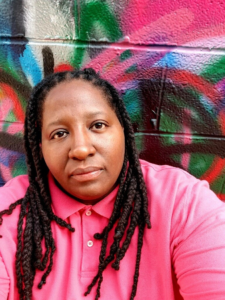 About The Author:
About The Author:
Dion Cartwright is the Director of Equitable Initiatives and Leadership Development at The Funders Network. She is also the lead staff for the PLACES Fellowship.
Know Your Network: Ella Delio of Greater New Orleans Foundation
By: Martha Cecilia Ovadia, Senior Associate for Equity Programs and Communications
Who are the people that make up The Funders Network? Know Your Network is an occasional Q&A series lifting up voices from across the network. In honor of the national Imagine a Day Without Water campaign on Oct. 21, TFN’s Martha Cecilia Ovadia chats — virtually, of course — with Elaine “Ella” Delio, director for environmental and regional initiatives at the Greater New Orleans Foundation. A co-chairperson of TFN’s Urban Water Funders steering committee, Ella also sits on the planning committee for the Urban Water Funders 2020 Virtual Meeting, which takes place Nov. 18-19. Responses have been edited for length and clarity.
Q : You are currently the director for environmental programs and regional initiatives for Greater New Orleans Foundation, but we hear you were trained in economics and finance before joining the sector. What drove your shift to environmental and climate issues?
I’ve always been interested in enterprise and business. I started off at Procter and Gamble in the Philippines, where I managed brands such as Vicks and Pringles. In 1998, when my mother had health issues, I was called to oversee our family’s businesses in the Philippines as the eldest of four children. My family’s businesses started as very small businesses that my parents literally ran from our home. These small businesses in logistics and security services grew from tens of employees to thousands of employees within 20 years. Managing these businesses helped me realize firsthand the importance of small and mid-sized businesses in the economic and social development of a country. This made me interested in the role of small and medium enterprises in a country’s development, which is why I decided to take my MBA and MPA. While at graduate school, I honed my skills in finance and economics because I had planned on going back to the Philippines and, hopefully, becoming part of the national government, perhaps as a department secretary.
It was at graduate school where I also read the book How to Change the World by David Bornstein. I learned about social entrepreneurs delivering positive social and environmental impacts all over the world. Reading this book led me to abandon a management consulting job offer in New York City and start work at a women’s small business development center called Center for Women Enterprise in Boston. (This is where I met and worked with the wonderful Alison Corwin of the Surdna Foundation ) [Note: Alison is also a TFN PLACES Fellowship alum.] We literally sat two feet apart from each other the whole day. At CWE, I helped high-growth potential women-led enterprises gain access to venture capital. This was important given that only 2% of venture capital in the early 2000s went to women-led firms. I worked with amazing women entrepreneurs and met inspiring ones such as Helen Greiner, founder of iRobot, and Mae Jemison, the first Black woman to travel to space. I also collaborated with venture capital and private equity investors in New England and New York in helping increase women-led businesses’ access to capital.
After getting married, I had to move to Washington D.C with my husband. An angel investor I worked with introduced me to the World Resources Institute (WRI), an environmental “think and do tank” which had an “access to capital” program similar to what I managed in Boston. It was a program called New Ventures, which provided business development and investment facilitation services to innovative environmental enterprises in Brazil, China, Colombia, India, Indonesia and Mexico. This is how I developed my expertise in the environment. WRI was also one of the foremost experts when it came to climate mitigation and it was one of the first environmental organizations that developed work on climate adaptation. Part of my work involved working with enterprises at the intersection of the environment and the “base of the pyramid,” a concept popularized by C.K. Prahalad. The base of the pyramid is the socio-economic group of the 2.7 billion people worldwide who live on less than a $2.50 a day. I had the honor of working with entrepreneurs who solved environmental issues but also contributed towards delivering better products and services for those who are at the base of the economic pyramid. One of them was S.K. Sharma, an entrepreneur and founder of SBA Hydro, who built and developed small-hydro power plants in partnership with communities in India to provide more reliable and cleaner energy for those who lived in poor, rural villages in India.
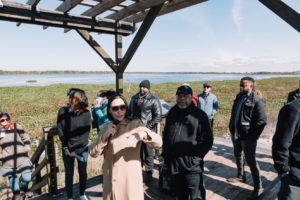
Q.: What brought you to philanthropy? Is there anything specific that has surprised you about working in the sector?
The Greater New Orleans Foundation (GNOF) is my first stint in philanthropy. I moved to New Orleans because my husband got his first job in academia here after obtaining his doctoral degree. When I was looking for a job in 2014, a couple of friends of mine spoke about the forward-looking work that GNOF was doing and that their building would be one of the first demonstration projects for green stormwater infrastructure in the city. That was intriguing to me given my previous work in the environment. My friend, Alison Corwin, had visited me in New Orleans in 2013 when she came for the Environmental Grantmakers Association Annual Retreat and told me that she had just started a job at the Surdna Foundation. This was the first friend of mine that joined philanthropy. When the position of director for environmental programs at GNOF opened up in 2014, Alison encouraged me to apply.
I had always thought that foundations just made grants. What has surprised me about working in the sector is how much community foundations work on the ground in partnership with non-profit partners and with government partners to solve critical issues. Moreover, in my work at GNOF, I have seen how a community foundation can help provide a platform for grassroots leaders to advocate to local or state governments for the needs and desired policies of their communities.
Q.: You are very involved in TFN’s Urban Water Funders working group. What is one thing you have learned working with Urban Water Funders that you think has been helpful or illuminating during this unprecedented time as we deal with the global coronavirus pandemic?
Since we decided to shift from being called the “Stormwater Funders” in 2017 to the Urban Water Funders, I think the Urban Water Funders working group increasingly centers racial equity in its programming as well as its aligned work. When the coronavirus pandemic happened, Urban Water Funders members immediately asked the question, “What kind of COVID-19-related programming can we offer not just to funder members but to their grantee partners as well?” In line with our equity focus, Urban Water Funders members agreed that it would be important to learn about how to advance water equity during the coronavirus recovery.
Given this, the TFN Urban Water Funders members, led by Sara Aminzadeh of Pisces Foundation organized a panel around this topic. One thing Ronda Chapman of PolicyLink made clear was how COVID-19 exposed the underinvestment and unjust city, state, and federal policies around water. For example, when COVID struck Detroit, there were 2,800 homes already experiencing water shutoffs. These homes were set back by not having access to water. Access to clean water is the most fundamental element for infection control and critical to good health. What I love about the Urban Water Funders is how relevant panels such as these can present bold ideas for consideration by funders. For example, Radhika Fox of the U.S. Water Alliance asked the group whether this is the time for philanthropy to provide funding to water utilities in order to support the end of water shutoffs. (Note: You can watch a recording of this Urban Water Funders panel here.)
Q.: You work with a lot of communities impacted by climate change at GNOF. What is one thing you wish folks knew about the people you are working with? What is the hardest part of doing this work?
The leaders that I work with serve communities impacted by climate change — from the Treme, the birthplace of Jazz which experiences localized flooding every year, to Dulac, home to many members of the United Houma Nation tribe and a land that is at risk of disappearing in the next 50 years due to coastal land loss and sea level rise. They have experienced various injustices and trauma in their lives. Despite that trauma and injustice, they continue to rise up time and again not just to help save their communities’ way of living and culture, but also their land, their neighborhood. I think the hardest part of doing work directly with community is hearing the hurt in their voices right after they experience an injustice or a disproportionate impact of climate change because of systemic racism. I am glad that GNOF is able to provide operating support to these leaders’ organizations. However, I ask myself what more can be done to help them with their restorative justice practices so that they can work towards a process of healing from the tremendous harm brought about by past injustices. One thing that I am working on in the regional affinity group that I belong to, the Greater New Orleans Funders’ Network, is experimenting on a pooled restorative justice fund for BIPOC leaders in Louisiana who work at the intersection of the environment and other issues.
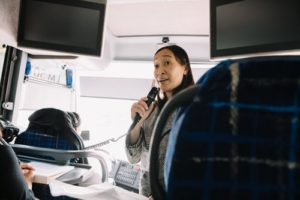
Q.: You hosted the TFN PLACES Fellowship cohort a few years back and we learned so much about how water and climate work is actually justice work during that site visit to New Orleans. As you know, Imagine A Day Without Water is Oct. 21. Do you have any specific ways you honor that personally? Why do you think it is so important to elevate this day in the sector?
I will talk about how I honor “Imagine a Day Without Water” every year on a personal level. I spend some reflection time on my own to remember how I grew up in the Philippines without reliable access to clean water. From the time I was born until I was 17, I lived in a house where we had to put a sock over our faucet in order to filter particles. There were several years when we had limited access to water and had to save big containers of water when there was water available, so that we can use it when there was no water coming out of the tap. I learned how to take a bath with just 6 to 7 quarts of water. Because of this, I do not take the water that I have access to for granted. During this day, I also try remember those who live in other countries where women have to walk for hours just to gain access to water and bring home some for their families.
Q.: We always like to ask about home. With so many of us sheltering in place or unable to travel, can we live vicariously through you just for one question? What is your perfect day in New Orleans? Is there a secret place you wish everyone knew about?
A perfect day in New Orleans for me would be to watch my 11-year old daughter play soccer at The Fly, which has the amazing benefit of being on the Mississippi River. I would then go on a bike ride with my husband and two kids from our home in the Carrolton-Riverbend neighborhood to Parkway Bakery and Tavern in Bayou St. John, known for their po-boys, where we would have lunch. I would order a golden friend shrimp po-boy. (Parkway is also the location of one of the first demonstration projects for a permeable pavement parking lot). We would then bike to City Park, a park bigger than Central Park, which got flooded during Katrina but was redeveloped after The Storm. My kids would play in the playground right beside Café du Monde where my husband and I would be feasting on beignets and an iced-coffee. (This is very close to the place where Brad Pitt and Kate Winslet have a scene together in The Curious Case of Benjamin Button). Later that night, my husband and I would have dinner at Arnaud’s in the French Quarter where I would order gumbo for appetizer, meunière for my entrée, French 75 for my cocktail, and bananas foster for my dessert. After dinner, we would head over to Frenchmen Street and listen to some jazz at d.b.a., a bar where the greats such as John Boutté play.
Q.: And finally, it’s been a heck of a year. What is something you do as a practice of self-care, especially in 2020 when this work is so stressful and requires us to really rise to the occasion and be present on so many fronts?
It has indeed been a year. During this pandemic, what has helped me recover from the immense stress from different sources are a. bike rides around the Audubon Park (which is less than a mile from our house), and b. doing a weekend trip at least once a month with my family. For example, my family and I spent the Labor Day weekend in the North Shore of the Greater New Orleans region where there is a beautiful biking trail. During that weekend, we also went sailing on Lake Ponchartrain for the first time with a GNOF colleague who lived in the North Shore. Being in the midst of a big body of water had such a profound healing and calming effect on me.
Featured photo at top of post: Ella Delio (center) making introductions at the 2019 GREEN and Urban Water Funders annual meeting in New Orleans.
GNOF Disaster Response and Restoration Fund
Due to the impacts of Hurricanes Sally, Laura, Delta, and Tropical Storm Marco, the Greater New Orleans Foundation has activated its Disaster Response and Restoration Fund to provide assistance to those who are most in need.
TFN Urban Water Funders
For more information about TFN’s Urban Water Funders, contact Diane Schrauth at diane@fundersnetwork.org or at (856) 834-3755. Registration is now open for the Urban Water Funders 2020 Virtual Meeting Nov. 18-19.
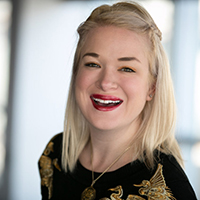 About the Author
About the Author
Martha Cecilia Ovadia is TFN’s Senior Program Associate for Equity Programs and Communications.
Equitable Economic Growth for the Green Infrastructure Ecosystem
By Lauren King, PhD, Director of Workforce Programs and Ella Delio, MPA, Director of Environmental Programs, Greater New Orleans Foundation (Cross Post)
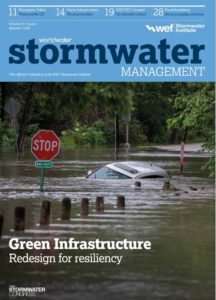 Lauren King, Greater New Orleans Foundation's director for workforce programs, and Ella Delio, the foundation's director of environmental programs and a member of TFN's Urban Water Funders steering committee, recently co-wrote an article for Water Environment Federation’s Stormwater magazine. The piece focuses on the equitable workforce development work that the foundation, the city of New Orleans, the Water Environment Federation and other partners are collaborating on in New Orleans around green stormwater infrastructure, highlighting the role of philanthropy in supporting this work. TFN is thrilled to have Greater New Orleans Foundation as one of TFN's upcoming 2021 conference co-sponsors.
Lauren King, Greater New Orleans Foundation's director for workforce programs, and Ella Delio, the foundation's director of environmental programs and a member of TFN's Urban Water Funders steering committee, recently co-wrote an article for Water Environment Federation’s Stormwater magazine. The piece focuses on the equitable workforce development work that the foundation, the city of New Orleans, the Water Environment Federation and other partners are collaborating on in New Orleans around green stormwater infrastructure, highlighting the role of philanthropy in supporting this work. TFN is thrilled to have Greater New Orleans Foundation as one of TFN's upcoming 2021 conference co-sponsors.
"In New Orleans, where the population of African Americans is more than 60 percent and unemployment among African American males has vacillated between 48 percent and 52 percent, the need was apparent. An opportunity in the form of around US $250 million in federal grants for GI Projects laid the foundation to develop the regions emerging GI sector - and the prospect of new jobs."
You can read the full article here.
About the Authors:
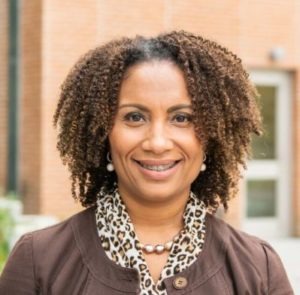 Lauren King, Director for Workforce Programs
Lauren King, Director for Workforce Programs
Lauren N. King has spent two decades linking adults and youth to resources and opportunities that enable them to move from their current reality to one which they desire to ascend. She is the Director for Workforce Programs with the Greater New Orleans Foundation (GNOF) where she works to cultivate new opportunities for GNOF in the workforce development space. Under her current portfolio, she leads the New Orleans Workforce Innovations (NOWI) Program which offers post-hire support services to some of the state’s largest employment sectors. Additionally, Lauren staffs the New Orleans Funder’s Collaborative, NOW, which has successfully influenced workforce policies within the region. In her previous role as Director of Community and Economic Development with Delgado Community College, Lauren managed and implemented workforce programs and played an integral role in the launching of two major programs for the College- the Certified Line Worker Training Program and the Cisco Certified Networking Associates Program. Under her leadership, Delgado obtained the designation of Cisco Networking Academy and is a provider of the Water Environmental Federation (WEF) National Green Infrastructure Certification program. Lauren continues to work extensively with training providers in an effort to align workforce trainings to programs that provide credit toward associate and bachelor degrees.
A native New Orleanian, Lauren is a two-time graduate of Xavier University of Louisiana holding a Bachelor’s of Arts Degree in Mass Communications and a Master’s of Arts Degree in Education-Curriculum and Design. She currently resides in New Orleans with her husband and children.
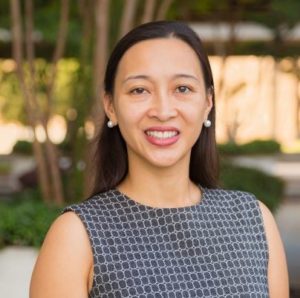 Ella Delio, Director for Environmental and Regional Initiatives
Ella Delio, Director for Environmental and Regional Initiatives
Elaine “Ella” Delio joined the staff of the Greater New Orleans Foundation as director of Environmental and Regional Initiatives in September 2014. Previously, she was executive vice president and managing partner at Savior Media, a Boston-based strategic communications firm. Prior to that role, Ella worked in Washington, D.C., at the World Resources Institute, an environmental think tank, where she served as Global Director of the New Ventures program. In that role, she provided business development and investment facilitation services to innovative environmental enterprises in Brazil, China, Colombia, India, Indonesia, and Mexico. She co-led the development of the program’s five year strategic plan, and she helped build the Green Investor Network in India, a group of investors interested in funding environmental entrepreneurs. In this capacity, she also worked with various funders from the philanthropic and public sectors.
Ella received her MBA and MPA degrees from the Harvard Business School and Harvard Kennedy School and her Management Engineering and Economics degrees from the Ateneo de Manila University in the Philippines. She was awarded the Don K. Price Award by the Harvard Kennedy School for academic distinction and leadership in public service.

